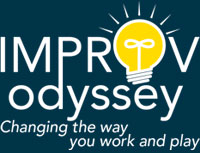IMPROV and the ROI
“Bottom line, how will Improv increase our sales, improve our morale, or our team? What guarantees do we have that everyone is going to benefit from this training? What can we expect to see after your work with us is over? Will we be a more productive workforce? Can we measure that? Will our staff.. read more →
FOCUS – Process Creates Story
More commentary on Spolin’s Tips and Pointers Pointer # 9 — The energy released in solving the problem, flowing through the Where, Who, and What, forms the scene. Taken from “Improvisation for the Theater” by Viola Spolin; 3rd Edition, Northwestern University Press. Solving a challenging problem constitutes a strong FOCUS. Viola Spolin used to call.. read more →
Commentary on Spolin’s Tips and Pointers: Part 1
How we do something is the process of doing (right now!). Pre-planning “How” makes process impossible and so becomes resistance to the focus of the exercise, and no “explosion” or spontaneity can take place, making any change or alterations in the student-actor impossible. True improvisation re-shapes and alters the student-actor through the act of improvising itself. Penetration into the focus, connection, and a live relation with fellow players result in a change, alteration, or new understanding for one or the other or both. In time, during the solving of the acting problem the student becomes aware of being acted upon and of acting, thereby creating process and change within his or her stage life. The intuition gained remains with the player in everyday life, for whenever a circuit is opened for anyone, so to speak, it is usable everywhere. read more →
Just Be Yourself
We ape, we mimic, we mock. We act. — Laurence Olivier Have you ever walked into an interview or an audition and the interviewer, in an effort to relax you, tells you “just be yourself”? And rather than helping you, you only get more butterflies in your stomach? Your mind races. “What does that mean.. read more →
Story, story…LIVE!
The game of Building a Story is a staple with improv groups around the world. It is the essence of collaboration by building a story one word at a time and by sharing ideas using give and take and intense listening. Invariably, the challenge wakes you up and your focus becomes stronger. There are many.. read more →
The Magic Bond of Playing
After 35 years of playing Spolin Games with various groups, I’ve noticed an interesting thing. I am struck by the fact that these groups as a result of playing together for an extended period, keep in touch with each other and often come together to play as opportunity permits. My first observation of this phenomenon.. read more →
The Difference between Spolin Games and Popular Improv
There is a profundity in Spolin’s work that is hard to capture and commoditize. It cannot be learned intellectually, but must be experienced firsthand to really be understood. There are only a handful of teachers carrying on her tradition, myself being one of them.
Improvisation began with Spolin. But other popular forms have emerged as more popular and have swept the world. I will try to explain the reason for this. read more →
Improv – The Long and the Short of It
Short Form and Long Form are the same The distinction between short form and long form is a development that stems from the going awry or misunderstanding the focus of a game. These terms get bandied about as if they are two separate disciplines. They are not. Spolin used these games as exercises to help.. read more →
Show! Don’t Tell!
When you don’t see where you are, all you can do is talk about it. You get a suggestion for a scene: Who — A husband and wife. Where — at Disneyland. What — waiting to get on a ride. Most players will begin the scene with dialogue something like this. Husband: Well, well, dear.. read more →
The Seduction of the Teacher
The Trap “Students who regard an instructor highly will tend to adopt that instructor’s attitudes, orientations, and values. This is a seductive phenomenon because it can lead to the ego-enhancement of instructors who have not reached full psychological maturity. This ‘ego-stroking’ can then motivate instructor behaviors which do not have the personal development of participants.. read more →








